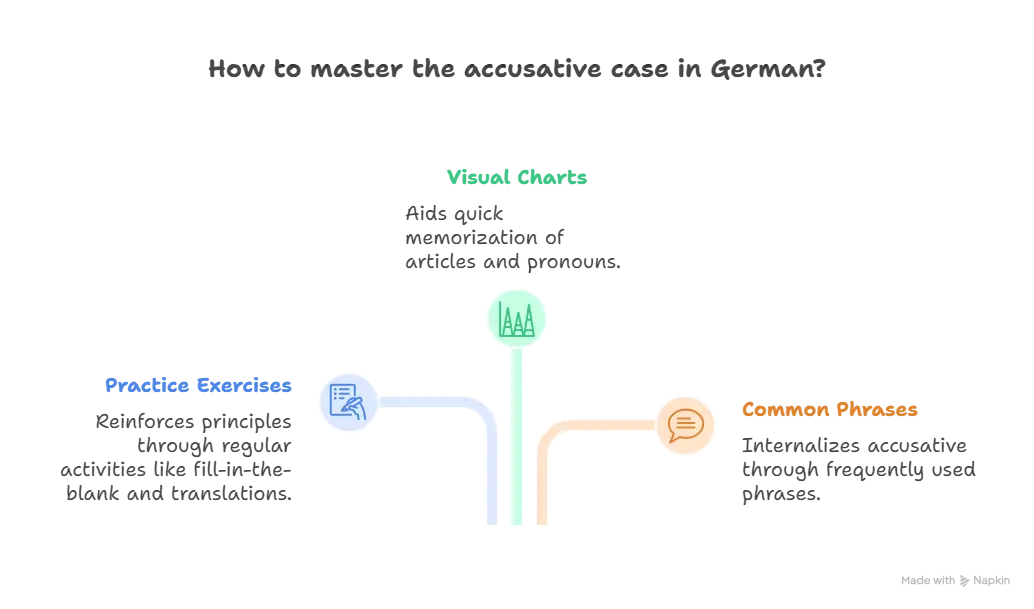Table of Contents
The concept of “cases” is one of the first grammatical subjects that you will encounter while you are studying German grammatical. Cases illustrate the function of each word in a sentence, including who is doing the action and who is acting as the recipient of it. If you want to speak about what or who something is occurring to, the accusative case is one of the most significant of these since it enables you to talk about it.
The direct object of a phrase is the person or thing that directly receives the action of the verb. In less complicated terminology, the accusative case is used for the direct object of a statement.
Learn German language in your own language! Get free Demo Classes Here!
What is the Accusative Case?
A German sentence’s direct object is the subject of the verb’s action. In this situation, the accusative proves it. It sheds light on the affected party or parties. Any question followed by “whom?” or “what?” will elicit an accusative case response. “Ich sehe den Hund” uses the accusative case since “den Hund” is the object of the gaze.
See the nominative case next to it for a better understanding of its meaning. The subject, or agent, is shown in the nominative case. Because “Der Hund läuft” refers to an action that the dog is doing, it is a nominative pronoun. The accusative case “den Hund” is used because the dog is the agent in the verb “ich sehe den Hund.” To review, nominatives tell us who is doing the action, whereas accusatives tell us who receives something.
When to Use the Accusative Case
1: How do you say "Good Morning" in German?
There are three primary contexts in which the accusative case is used in German: when referring to direct objects, when using certain prepositions, and when utilizing particular temporal expressions. You will be able to compose sentences that are grammatically acceptable and sound more natural in German if you have a better understanding of their applications.
1. Direct Objects
When a verb’s action has a direct impact on a specific person or thing, we speak about them in the accusative case. Always follow a verb with a question like “whom?” or “what?” to uncover the direct object.
Consider the following examples:
- Ich sehe den Hund. → I see the dog.
- Er kauft einen Apfel. → He buys an apple.
- Wir lieben die Musik. → We love the music.
2. Accusative Prepositions
German accusative case is used to convey duration or timing. It indicates action length, frequency, or time. I’m staying one day employs the accusative to express length. Er arbeitet jeden Abend (He works every evening) uses “jeden Abend” to indicate frequency. Sie will leave next Monday utilizes the accusative to indicate a certain time. These examples demonstrate that German time expressions use the accusative case for length, routine, and time.
Examples:
- Wir gehen durch den Park. → We walk through the park.
- Das Geschenk ist für dich. → The gift is for you.
- Sie spielen gegen die Mannschaft. → They play against the team.
- Er kommt ohne seinen Freund. → He comes without his friend.
3. Accusative with Time Expressions
The German accusative case is used with time expressions to show duration or timing. It indicates event length, frequency, or time. I’m staying one day uses “einen Tag” to indicate length. Er arbeitet jeden Abend denotes frequency, whereas Sie fährt nächsten Montag denotes a particular time. To clarify when or how long something occurs, the accusative time phrase is used in all these circumstances.
Examples:
- Ich bleibe einen Tag. → I’m staying for one day.
- Er arbeitet jeden Abend. → He works every evening.
- Sie fährt nächsten Montag. → She is leaving next Monday.
|
German A2 Exercises – Download Free PDF |
||
Speak German Fluently – Your Future Starts Here!
Join our interactive German courses designed for all levels. Gain the skills to communicate effectively and open doors to new cultures and careers.
Start Learning GermanAccusative Articles and Pronouns
There are several articles and pronouns in German that take on a different form when they are in the accusative case, particularly when they are masculine nouns. When expressing who or what is getting the action in a sentence, it is crucial to have a solid understanding of these shifts since it enables you to utilize acceptable language.
Accusative Articles
| Gender | Nominative | Accusative |
|---|---|---|
| Masculine | der | den |
| Feminine | die | die |
| Neuter | das | das |
| Plural | die | die |
Examples:
- Ich sehe den Mann. → I see the man.
- Ich höre die Frau. → I hear the woman.
- Ich habe das Buch. → I have the book.
Personal Pronouns in the Accusative
| Nominative | Accusative | English |
|---|---|---|
| ich | mich | me |
| du | dich | you |
| er | ihn | him |
| sie | sie | her |
| es | es | it |
| wir | uns | us |
| ihr | euch | you (plural) |
| sie | sie | them |
| Sie | Sie | you (formal) |
Examples:
- Er liebt mich. → He loves me.
- Ich sehe ihn. → I see him.
- Sie kennt uns. → She knows us.
Common Mistakes Learners Make
Many learners make blunders while studying the accusative case.
- Confusing nominative and accusative: Many students first confuse the nominative and accusative forms. They might employ the subject form instead of the object form, particularly for masculine words. People say “Ich sehe der Mann” instead of “Ich sehe den Mann.”
- Forgetting to change masculine articles: In the accusative case, some neglect to convert der to den. This error is common with single male nouns, as feminine, neuter, and plural articles don’t change.
- Using the wrong pronouns: Students often utilize incorrect accusative pronouns. They may say “Ich sehe er” instead of “Ich sehe ihn.” Pay attention to these adjustments to speak German correctly and prevent misunderstandings.
Tips to Master the Accusative Case
Through consistent practice and the use of certain clever study strategies, it is much simpler to become proficient in the accusative case in German.
1. Practice Exercises: It is helpful to reinforce the principles by doing fill-in-the-blank exercises, translations, and sentence-building assignments on a regular basis. Changing the articles in phrases or recognizing direct objects in brief texts are two examples of activities that might help with confidence building.
2. Visual Charts for Quick Memorization: Keep a little table with accusative articles and pronouns close at hand. Visual charts are a great way to help you memorize information quickly. The use of visual aids facilitates the process of remembering changes such as der → den or ich → mich, enabling you to recollect them in a more expedient manner, whether you are speaking or writing.
3. Common Phrases and Sentences: Acquiring words and phrases that are frequently used is beneficial in the process of naturally internalizing the accusative. The phrases “for dich” (which means “for you”), “without me” (which means “without me”), and “through den Park” (which means “through the park”) are all examples of phrases that may be used in regular discussions.
|
Goethe 2025 Exam Dates: Multiple Test Centers |
|
| Trivandrum Goethe Exam Dates | Kochi Goethe Exam Dates |
| Chennai Goethe Exam Dates | Coimbatore Goethe Exam Dates |
Speak German Fluently – Your Future Starts Here!
Join our interactive German courses designed for all levels. Gain the skills to communicate effectively and open doors to new cultures and careers.
Start Learning GermanAccusative Case Exercises
In order to familiarize yourself with the accusative case in German, here is a collection of interactive tasks. In addition to interpreting them, you may try filling them in, constructing phrases, and adding words.
1. Fill-in-the-Blanks
Choose the correct accusative article or pronoun:
- Ich sehe ___ Hund. (der)
- Er kauft ___ Apfel. (der)
- Wir lieben ___ Musik. (die)
- Sie besucht ___ Freund. (der)
- Kannst du ___ helfen? (ich)
Answers: den, den, die, den, mich
2. Sentence Formation
Rearrange the words to make a correct sentence in the accusative case:
- (sehen / ich / Film / den) → _____________________
- (haben / wir / Buch / das) → _____________________
- (liebt / er / Katze / seine) → _____________________
- (gehen / durch / Park / wir / den) → _____________________
Answers:
- Ich sehe den Film.
- Wir haben das Buch.
- Er liebt seine Katze.
- Wir gehen durch den Park.
3. Translation Exercises
Translate the following sentences into German using the accusative case:
- I see the woman.
- She buys a car.
- We love the children.
- He walks around the lake.
Answers:
- Ich sehe die Frau.
- Sie kauft ein Auto.
- Wir lieben die Kinder.
- Er geht um den See.
Learn German language in your own language! Get free Demo Classes Here!
Summary
In the German language, this is the accusative case. It gives you very specific information about who or what the verb is doing. Because it specifies “who” or “what,” it is of utmost significance when it comes to composing words that are both clear and truthful. A significant amount of the time, the accusative is used for direct objects, certain prepositions (such as through, for, against, without, and uh), and phrases that indicate when something occurs or how long it continues to exist.
When you utilize the accusative case, the word changes from der to den. Neither the feminine nor the neuter nor the numerous words have been altered in any way. Personal terms such as “ich” and “me” and “er” and “he” are also subject to modification. When individuals make errors, they often confuse the nominative and accusative forms, fail to remember to alter the male articles, or employ the incorrect gender. If you frequently practice with assignments, flashcards, and common phrases, you will be able to learn the accusative case and utilize it appropriately in ordinary German terms.
Speak German Fluently – Your Future Starts Here!
Join our interactive German courses designed for all levels. Gain the skills to communicate effectively and open doors to new cultures and careers.
Start Learning GermanFrequently Asked Questions
How do I know when to use the accusative?
Use the accusative for direct objects, after certain prepositions (durch, für, gegen, ohne, um), and with time expressions showing duration or specific time.
Can prepositions affect the case?
Yes. Certain prepositions always require the accusative, such as durch, für, gegen, ohne, and um.
How can I master the accusative case?
Practice with fill-in-the-blank exercises, sentence formation, visual charts, and common phrases to reinforce articles, pronouns, and prepositions.
How do I identify the direct object in a sentence?
Ask “whom?” or “what?” after the verb. The answer is the direct object and takes the accusative case.
-
Example: Ich sehe den Hund. → Whom do I see? The dog → accusative
Can pronouns replace nouns in the accusative?
Yes. Pronouns like mich, dich, ihn, sie, es, uns, euch, sie, Sie replace the direct object:
-
Ich sehe den Hund → Ich sehe ihn.
Which prepositions always take the accusative?
The common accusative prepositions are:
durch (through), für (for), gegen (against), ohne (without), um (around).












